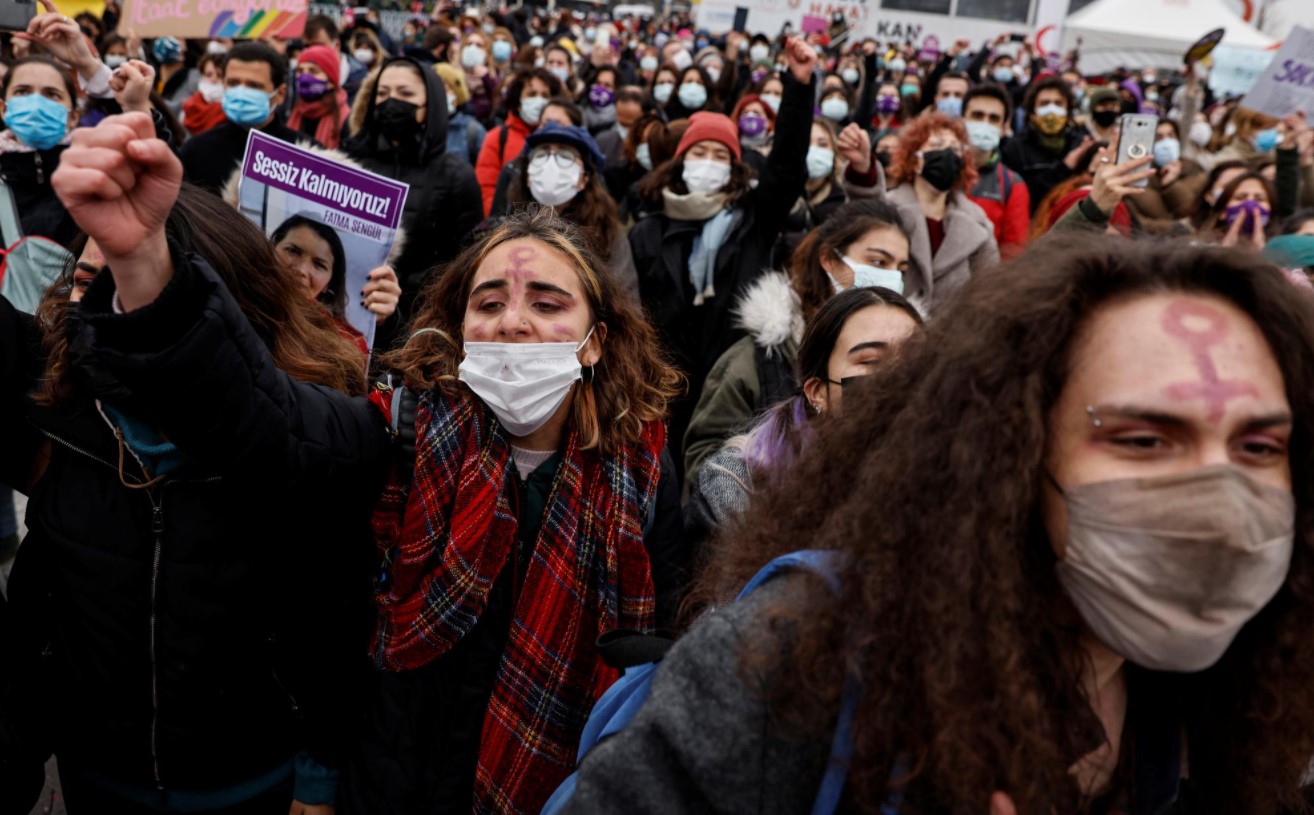
ISTANBUL (Reuters) – US and European leaders denounced what they called Turkey’s baffling and concerning decision to pull out of an international accord designed to protect women from violence, and urged President Tayyip Erdogan to reconsider.
Erdogan’s government on Saturday withdrew from the Istanbul Convention, which it signed onto in 2011 after it was forged in Turkey’s biggest city. Turkey said domestic laws, not outside fixes, would protect women’s rights.
The Council of Europe accord pledged to prevent, prosecute and eliminate domestic violence and promote equality. Killings of women have surged in Turkey in recent years and thousands of women protested on Saturday against the government’s move in Istanbul and other cities.
The United States, Germany, France and the European Union responded with dismay – marking the second time in four days that Europe’s leaders have criticized Ankara over rights issues, after a Turkish prosecutor moved to close down a pro-Kurdish political party.
US President Joe Biden said Turkey’s withdrawal from the accord was “deeply disappointing” and a step backward in efforts to end violence against women globally.
“Around the world, we are seeing increases in the number of domestic violence incidents, including reports of rising femicide in Turkey,” Biden said in a statement on Sunday. “Countries should be working to strengthen and renew their commitments to ending violence against women, not rejecting international treaties designed to protect women and hold abusers accountable.”
EU foreign policy chief Josep Borrell said late on Saturday that the decision was incomprehensible and “risks compromising the protection and fundamental rights of women and girls in Turkey (and) sends a dangerous message across the world. … We therefore cannot but urge Turkey to reverse its decision.”
European Commission President Ursula von der Leyen – who spoke with Erdogan a day before Turkey ditched the pact – wrote on Twitter on Sunday: “Women deserve a strong legal framework to protect them,” and she called on all signatories to ratify it.
The Council of Europe, which gathers 47 members states, also regretted the decision.
The convention had split Erdogan’s ruling AK Party (AKP) and even his family. Officials floated pulling out last year amid a dispute over how to curb domestic violence in Turkey, where femicide has tripled in 10 years, one monitoring group has said.
But many conservatives in Turkey and in Erdogan’s Islamist-rooted AKP say the pact undermines family structures, encouraging violence. Some are also hostile to its stance against discrimination on grounds of sexual orientation.
“The Istanbul Convention, originally intended to promote women’s rights, was hijacked by a group of people attempting to normalize homosexuality – which is incompatible Turkey’s social and family values. Hence the decision to withdraw,” Turkey’s presidential communications director, Fahrettin Altun, said in a statement.
Paris said Turkey’s withdrawal marked a new regression in respect for human rights, while Berlin said neither culture, religion nor tradition could “serve as an excuse for ignoring violence against women”.
The diplomatic strain comes after Europe and the United States this past week said the move to close down parliament’s third-largest party, the pro-Kurdish Peoples’ Democratic Party (HDP), undermined democracy in Turkey.
In their video call on Friday, Erdogan, Von der Leyen and European Council President Charles Michel discussed a dispute, which has cooled, over offshore resources in the eastern Mediterranean.
An EU summit this week will address relations with Ankara.
Reporting by Jonathan Spicer; Additional reporting by Andrea Shalal in Washington and Sybille de La Hamaide in Paris; Editing by Frances Kerry, Barbara Lewis and Daniel Wallis




